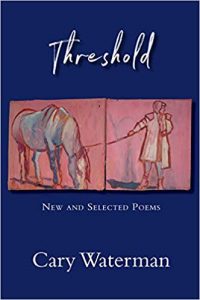
Published by Nodin Press
Cary Waterman’s Threshold: New and Selected Poems is comprised of poems of habitation, where the poet survives by asking herself the questions relevant to authority, respect, dread, and fatality. The selected poems from Waterman’s previous collections show an evolution, with time, not of concerns but of understanding and attitude. The poet wanders the fence line of her household in the selections from First Thaw (1975) and shapes somber poems of stunning, tangible animal imagery that swaps from domesticity and sovereignty. She writes, “The ducks are obedient. / Every night they anticipate like wives / going to bed in their wooden box, / protection against coon and skunk. / …They have become pets…” The selections from The Salamander Migration (1980) and Dark Lights the Tiger’s Tail (1981) expand the margins. Roles shift into motherhood and daughterhood as the poet cultivates the dark and the gloom between each line, dragging the heart though every precisely illustrated scene. Poems from When I Looked Back You Were Gone (1992) and Book of Fire (2018) are poems concerned with loss. The poet stumbles over the dead and the disappeared when finding their artifacts: an empty bed, a Band-aid, an unread gifted book. This all precedes the amazing assembly of new poems at the end of the book where the poet seems to gain a supernal sense of place and a certainty in the company of the unliving and their realm. The poet travels broadly, moments float, buoyant on the threshold of the hereafter, oblivion, and heavenly peace, locations become the body in tranquility. In lines of the title poem, Waterman writes, “This is not a poem, not a drowning / not a fence to keep me out / but a linen invitation to the singing.” Waterman shows a genuine evolution of the poet as observer and interrogator of nature. Seasons pass, each one reckoned with, throughout each section of the book, and they are inevitable and challenging until finally they are unobserved in the migration of the poet, body and spirit. The book sincerely lays forth the poet through stages of a life truly examined and ultimately contented with— “Nobody seems to be in charge of my ascent or descent. Then I realize I’ve gotten over it, finally.”–Ty Newcomb